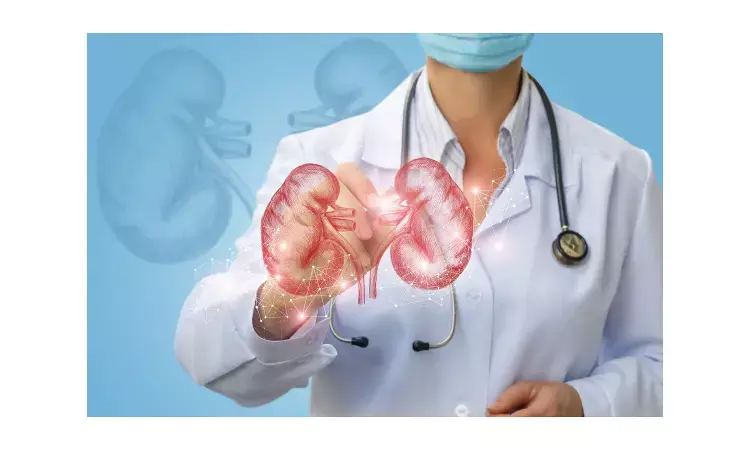- Home
- Medical news & Guidelines
- Anesthesiology
- Cardiology and CTVS
- Critical Care
- Dentistry
- Dermatology
- Diabetes and Endocrinology
- ENT
- Gastroenterology
- Medicine
- Nephrology
- Neurology
- Obstretics-Gynaecology
- Oncology
- Ophthalmology
- Orthopaedics
- Pediatrics-Neonatology
- Psychiatry
- Pulmonology
- Radiology
- Surgery
- Urology
- Laboratory Medicine
- Diet
- Nursing
- Paramedical
- Physiotherapy
- Health news
- Fact Check
- Bone Health Fact Check
- Brain Health Fact Check
- Cancer Related Fact Check
- Child Care Fact Check
- Dental and oral health fact check
- Diabetes and metabolic health fact check
- Diet and Nutrition Fact Check
- Eye and ENT Care Fact Check
- Fitness fact check
- Gut health fact check
- Heart health fact check
- Kidney health fact check
- Medical education fact check
- Men's health fact check
- Respiratory fact check
- Skin and hair care fact check
- Vaccine and Immunization fact check
- Women's health fact check
- AYUSH
- State News
- Andaman and Nicobar Islands
- Andhra Pradesh
- Arunachal Pradesh
- Assam
- Bihar
- Chandigarh
- Chattisgarh
- Dadra and Nagar Haveli
- Daman and Diu
- Delhi
- Goa
- Gujarat
- Haryana
- Himachal Pradesh
- Jammu & Kashmir
- Jharkhand
- Karnataka
- Kerala
- Ladakh
- Lakshadweep
- Madhya Pradesh
- Maharashtra
- Manipur
- Meghalaya
- Mizoram
- Nagaland
- Odisha
- Puducherry
- Punjab
- Rajasthan
- Sikkim
- Tamil Nadu
- Telangana
- Tripura
- Uttar Pradesh
- Uttrakhand
- West Bengal
- Medical Education
- Industry
RAASis discontinuation causes recurrent hyperkalemia and hospitalization: Study

France: A new study by Patrick Rossignol and the team revealed that recurrent hyperkalemia (HK) is associated with RAASi discontinuation and dose lowering. Among those with recurrent HK, HK is the major cause of hospitalization. Therefore, there is a need for more effective strategies for HK mitigation. The findings of the study are published in Clinical Kidney Journal.
Hyperkalaemia is often a chronic or recurrent condition requiring long-term management in chronic kidney disease (CKD), along with other chronic conditions such as heart failure (HF) and diabetes mellitus (DM). These patients benefit from renin-angiotensin-aldosterone system inhibitors (RAASis) at the maximum tolerated guideline-recommended doses, as they can improve cardiovascular and renal outcomes and reduce mortality and hospitalizations, particularly in patients with HF with reduced ejection fraction (HFrEF).
The objective of the study was to investigate the contemporary multidimensional management of recurrent HK and related healthcare resource utilization in routine clinical practice across Europe.
The study was a retrospective chart review conducted in five European countries including patients, not on dialysis with two or more HK episodes (sK ≥5.5 mEq/L) documented within a 12-month observational period. Hospital- and office-based physicians located in France, Germany, Italy, Spain, and the UK participated between June and September 2016. HK treatment and RAASi use were compared between two subsequent HK episodes (HK1 and HK2). Hospitalizations related to HK or comorbidities were documented.
A total of 1457 patients, mean age was 66 years. Comorbidities were common: CKD 68%, HF 40%, diabetes 36% and hypertension 72%.
The results of the study were
• A RAASi prescription was reported for 60.5% of the patients. Angiotensin-converting enzyme inhibitors (ACEis) were most common (40.7% of all patients), and MRA use was <30% in HF.
• A total of 326 hospitalizations were reported in 307 patients, including 112 hospitalizations (36% of all hospitalizations) related directly to HK.
• The proportion of patients with RAASi prescription was lower at HK2 than at HK1 for all medication classes.
Rossignol and the team concluded that "Recurrent HK was associated with RAASi discontinuation and dose lowering. Among patients with recurrent HK, a major cause of hospitalization is HK. More effective HK mitigation strategies thus are needed."
Reference:
Patrick Rossignol, Luis M Ruilope, Adamasco Cupisti, Markus Ketteler, David C Wheeler, Marc Pignot, Georgiana Cornea, Thierry Schulmann, Lars H Lund, Recurrent hyperkalaemia management and use of renin–angiotensin–aldosterone system inhibitors: a European multi-national targeted chart review, Clinical Kidney Journal, Volume 13, Issue 4, August 2020, Pages 714–719, https://doi.org/10.1093/ckj/sfz129
Medical Dialogues consists of a team of passionate medical/scientific writers, led by doctors and healthcare researchers. Our team efforts to bring you updated and timely news about the important happenings of the medical and healthcare sector. Our editorial team can be reached at editorial@medicaldialogues.in.
Dr Kamal Kant Kohli-MBBS, DTCD- a chest specialist with more than 30 years of practice and a flair for writing clinical articles, Dr Kamal Kant Kohli joined Medical Dialogues as a Chief Editor of Medical News. Besides writing articles, as an editor, he proofreads and verifies all the medical content published on Medical Dialogues including those coming from journals, studies,medical conferences,guidelines etc. Email: drkohli@medicaldialogues.in. Contact no. 011-43720751


